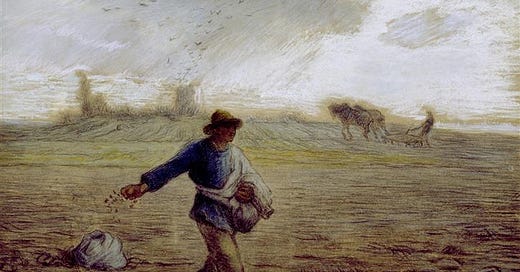We began our second session with a helpful image from the Belgian Catholic theologian Servais Pinckaers for understanding how the Beatitudes work:
We can compare the work of the Beatitudes to that of a plow in the fields. Drawn along with determination, it drives the sharp edge of the plowshare into the earth and carves out, as the poets say, a deep wound, a broad furrow. With the same movement it turns the earth over to uproot the weeds, and prepares the ground for the seed which will fall into the renewed soil to shelter there, germinate and fructify.
In the same way the word of the Beatitudes penetrates us with the power of the Holy Spirit in order to break up our interior soil. It cuts through us with the sharp edge of trials and with the struggles it provokes. It overturns our ideas and projects, reverses the obvious, thwarts our desires, and bewilders us, leaving us poor and naked before God. All this, in order to prepare a place within us for the seed of new life, the seed of the Gospel which will bear fruit a hundredfold at harvest time if we have known how to welcome it and guard it with the patience of faith and the tenacity of hope.
From there, we looked at how the second and third Beatitudes carve open the soil of our hearts and plant the seed of new life inside.
Flourishing are those who mourn
The sweep of church history gives us a broad view of what Jesus means by mourning: flourishing are those who mourn the sin within (the first 1500 years of the church) and the sadness all around (the Reformation and after). But Jesus also makes a deep connection to the story of the Bible by directly echoing Isaiah 61:
The Spirit of the Sovereign Lord is on me,
because the Lord has anointed me
to proclaim good news to the poor.
He has sent me to bind up the broken-hearted,
to proclaim freedom for the captives
and release from darkness for the prisoners,
to proclaim the year of the Lord’s favour
and the day of vengeance of our God,
to comfort all who mourn,
and provide for those who grieve in Zion –
to bestow on them a crown of beauty
instead of ashes,
the oil of joy
instead of mourning,
and a garment of praise
instead of a spirit of despair.
They will be called oaks of righteousness,
a planting of the Lord
for the display of his splendour.
Israel is in exile. The promises of God—for Israel and for the whole of creation—seem like they have come to an end. The people are mourning. Their exile brings into view humanity’s primal exile as well. Just as Israel mourns because they were torn away from their land, all creation mourns because we were torn away from Eden.
But a day of comfort is coming. In Christ, a new age of comfort—or consolation—has begun. The exile is over. This is what Simeon glimpsed as he beheld the infant Jesus (Luke 2:25-32) and what we will fully behold when Jesus returns to open for us the gate of a new Eden (Revelation 22:1-3)
Until then, we flourish as we join the whole of creation in its groaning (Romans 8:18-27). This is hard, but Jesus is pushing us to embrace reality. Our mourning is the wound into which Jesus plants the seed of his comfort.
Flourishing are the meek
We flourish when we mourn, but what do we do with our anger at all that has gone wrong with the world? This is where the third Beatitude comes in.
Meekness is not weakness. It is what Aristotle called the virtue of patience (praus in Greek, the same word as in the Beatitudes). For Aristotle, the meek person “is angry at the right things and with the right people, and, further, as he ought, when he ought, and as long as he ought.”
We find a similar understanding in Psalm 37, quoted by Jesus in the third Beatitude:
Refrain from anger and turn from wrath;
do not fret [literally burn in Hebrew] – it leads only to evil.
For those who are evil will be destroyed,
but those who hope in the Lord will inherit the land.A little while, and the wicked will be no more;
though you look for them, they will not be found.
But the meek will inherit the land
and enjoy peace and prosperity.
God’s faithful people are angry. It looks like the wicked are inheriting the earth. The fire of anger is burning inside God’s people in an unhealthy way and they are tempted to lay claim to God’s promises by going against God’s will.
But the end never justifies the means. Means and ends must go hand in hand. The call of meekness is this: “Be angry and do not sin” (Ephesians 4:26). The meek person is able to take the energy of their anger and direct it toward trusting in the Lord and doing good (Psalm 37:3).
The second and third Beatitudes could not be more relevant for us as we hear the news of church abuse scandals, mass shootings and the dereliction of duty on the part of Uvalde police officers. Jesus calls us to mourn and refrain from wrath — and he declares that this is true flourishing.
These recent words from Alan Jacobs sum up this challenge clearly:
I don’t want to consume my anger and pain by shoveling them into a red-hot social-media furnace. Denunciations do no good.
I want to keep my anger and pain close to me, inside me, even though it hurts, and find some proper outlet for them — as I say, to synthesize my thoughts and my feelings into meaningful moral action. …
I am asking myself some questions that I think all of us would do well to ask in these times: If there were no social media — no Twitter, no Facebook, no blogs even — what would I do? Whom would I seek to address and how would I address them? Would I use words only, or would I take action? And if the latter, what would proper action be? Imagine that all the familiar means of “getting things off my chest” were denied to me — what would I do then?
See you on June 12 for our next class on the Beatitudes.
We’ll linger on the meaning of righteousness throughout the Bible, why we flourish when we hunger and thirst for it, and how it is displayed in mercy and purity of heart.















Share this post